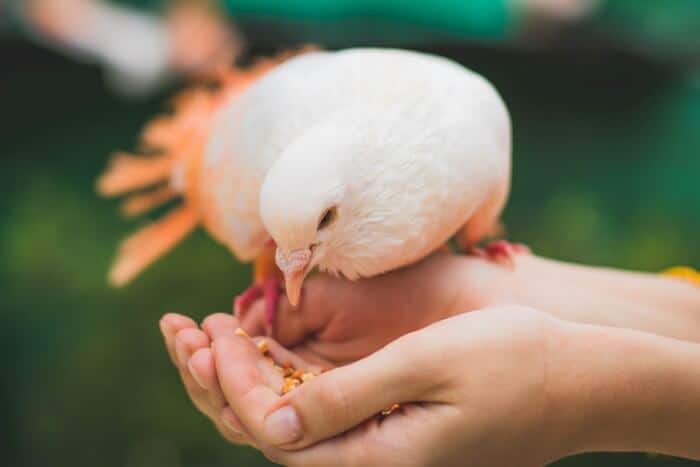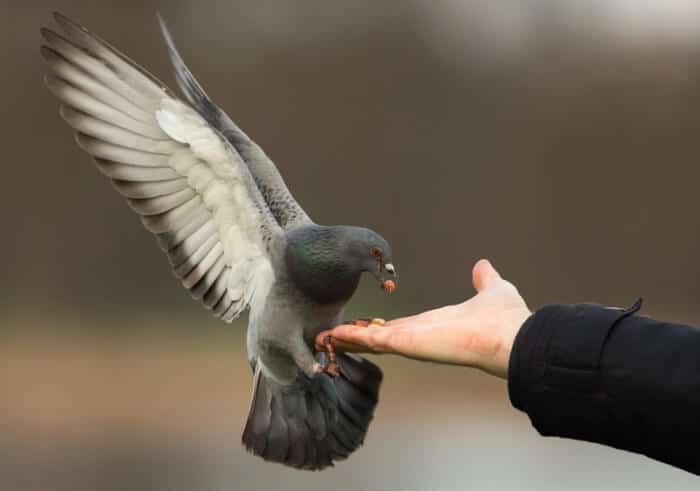If you have a pet pigeon, chances are that you want to take the best care of it that you can and that starts with feeding them the right diet.

If you’ve ever tried to purchase birdseed at a pet store, you know that there are many different kinds and mixes, which can make it difficult to determine which is the best pigeon food.
As an Amazon Associate I earn a small fee from qualifying purchases made through Amazon links. This helps us run the site – thanks for your support!
As a general rule, a premixed bag of pigeon pellets or pigeon feed will have the perfect nutritional balance for your pigeon.
Pet Pigeon Diets
If you have a pet pigeon, you have a good opportunity to provide it with an optimal diet, something that isn’t always possible for wild pigeons.
A large part of your pet’s diet will be seeds.
You can mix this yourself or buy a formulated product that’s created specifically for pigeons.
The mix should contain a good variety of several different seeds and grains.
You should also provide some fruits and vegetables in the mix.
Many experts say that pigeon pellets are the best pigeon food because they are specifically created to meet the unique nutritional needs of your pet bird.
Wild Pigeon Diets
Wild pigeons spend a lot more time scavenging for food than a pet pigeon.
They tend to gravitate toward seeds and grains they can find in as well as leftover food items in rubbish bins/piles.

Wild pigeons may also eat small snails, slugs, insects, and earthworms, something that most pet pigeons don’t have access to.
These protein sources contribute to a well-rounded diet and can be mimicked for a pet bird; if desired and recommended by a veterinarian.
Racing Pigeon Diets
For homing and racing pigeons, protein should be the focus because this kind of bird expends more calories than the average pigeon because it is much more active.
This protein generally comes from plant sources, but you can often find the ideal protein balance in pigeon feed that is formulated for homing and racing pigeons.
These birds also need adequate amounts of minerals and grit in their food.
Also Read: 8 Racing Pigeon Tips
What Nutrients Do Pet Pigeons Need?
Animals have different nutritional needs to one another and humans. Pigeons are no exception.
They need the right blend and amount of many nutrients to support good health, protect their immune systems, and make them happy and content birds.
The best way to ensure that your pet pigeon is getting the nutrition that it needs is to feed it only high quality seed and mixes made with quality ingredients.
Some of the specific nutrients they need are listed below.
- Calcium – this nutrient protects your pigeon’s bones and ensures that if it lays eggs, the shells are strong and viable.
- Vitamin D3 – this nutrient helps your pigeon absorb calcium, ensuring that levels stay healthy.
- Vitamin A – a deficiency in vitamin A can lead to a variety of health problems for your pigeon.
- Probiotics – these nutrients aid in proper digestion and help ensure that your pigeon’s intestines are absorbing proper amounts of the vitamins and minerals it needs
- Protein – protein helps build strong claws and beaks and gives your pigeon energy to fly and walk around when you let him or her out of the cage.
- B complex – this collection of vitamins supports a wide range of a bird’s bodily functions.
- Vitamin E – supports a healthy metabolism.
- Vitamin K – helps kill bacteria in your pigeon’s bowels, preventing diseases and other health problems.
- Ascorbic acid – promotes a healthy liver and controls the metabolism of your bird.
As you can see, a pigeon needs a wide range of nutrients and it’s your job to choose a food that ensures that your pigeon is getting the vitamins and minerals that it needs.
Fortunately, this isn’t as hard as overwhelming as it might seem.

This article was written by our qualified veterinarian Cristina.
This is part of our commitment to providing you with the most trustworthy veterinary advice for your pigeons.
What Can I Feed My Pigeon?
If you choose a premixed bag of feed or pigeon pellets, there’s a good chance that your pigeon will get what it needs.
If you worry that it might have a deficiency of a certain nutrient, talk to your veterinarian about what signs to look for.
Make sure that you read labels carefully and don’t overload your pigeon on a certain nutrient since some vitamins and minerals can be toxic in large doses.
Seeds are likely to be the primary source of food for your pigeon. For that reason, try to offer your pet a variety of seeds instead of the same one all the time.
One of the most common is sunflower seeds, but a bird-seed mix designed for pigeons is your best bet.
Sprouted seeds are another item you may want to offer your pigeon from time to time.
In addition to seeds, be sure your pet pigeon is getting some grains in its diet. This can be a mixture of corn, wheat, rye, barley, and millet.
If you buy a mixed pigeon food or pellet product, grains are usually included in the mix.
Some kinds of cereal are also ideal for an optimal pigeon diet.
Fruits and vegetables are another easy and delicious way to increase your pigeon’s intake of important vitamins and minerals.
Grapes and apples are ideal choices, but you can mix and match them to see what your pigeon likes best.
Berries are a good choice from time to time.
Be sure to cut fruits into small pieces that your pigeon can pick up and chew on without danger of choking.
You should also add some greens to the mix.
Try to stay away from items that are high in water, such as iceberg lettuce or celery, because they don’t offer much in the way of nutrition.
Good choices include spinach and other dark leafy greens. Pigeons can also eat peas.
Some experts recommend making about half of your pigeon’s diet in the form of pellets.
They are specially formulated to meet your bird’s nutrient needs and by offering them half the time, you can still feed your pigeon other items without worrying about vitamin and mineral deficiencies.
Don’t forget to offer water to your pigeon as well.
Bottled water is a good option if there are any issues with your tap water.
Be sure your bird always has access to a water source.
How Much a Pigeon Needs to Eat
The best way to make sure your pigeon is getting the food it needs is to let it out of its cage and allow it to seek its food from where you leave it around the house.
As a pet, your pigeon is bound to get enough food to satiate hunger and protect its overall health.
However, you want to make sure your pigeon isn’t overeating, as this can be harmful and can lead to certain health problems, using a good pigeon feeder can help ensure that they get enough food without overindulging.
Talk to your veterinarian if you have any concerns about what or how much your pigeon is eating.
What Not to Feed Your Pigeon
There are plenty of options for feeding your pigeon, but there are some items that can make it sick or lead to death.
This includes avocado, chocolate, and anything containing xylitol.
Avoid giving your pigeon bread because it’s not nutritionally sound.
Don’t give your bird any people food unless it is in the above-mentioned items, such as fruits and vegetables.
Sources:
